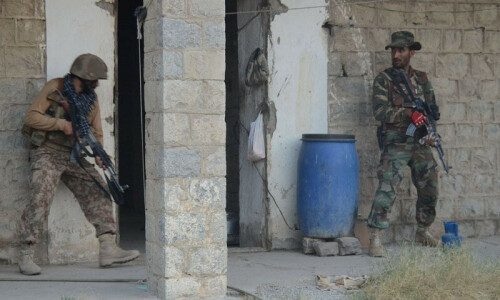KYAUKTAW: Cyclone Mocha crashed through Myanmar and southeastern Bangladesh on Sunday, sparing sprawling refugee camps but bringing a storm surge to swathes of western Myanmar where communications were largely cut off.
Mocha made landfall between Cox’s Bazar in Bangladesh and Myanmar’s Sittwe packing winds of up to 195 kilometres (120 miles) per hour, in the biggest storm to hit the Bay of Bengal in over a decade.
By late Sunday the storm had largely passed, and India’s weather office said it would weaken as it hit the rugged hills of Myanmar’s interior.
Some 400-500 makeshift shelters were damaged in camps housing almost one million Rohingya refugees in Bangladesh’s Cox’s Bazar but there were no immediate reports of casualties, refugee commissioner Mizanur Rahman said.
400-500 makeshift shelters damaged in camps housing one million Rohingya refugees
Disaster official Kamrul Hasan said the cyclone had caused “no major damage” in Bangladesh, adding authorities had evacuated 750,000 people ahead of the storm.
Communications with the port town of Sittwe in Myanmar were largely cut off following the storm.
The wind ripped apart homes made of tarpaulin and bamboo at one camp for displaced Rohingya at Kyaukphyu in Myanmar’s Rakhine state. Its residents were anxiously watching the rising sea tide, camp leader Khin Shwe said.
“We are now going to check whether sea water is increasing to our place ... if the seawater rises, our camp can be flooded,” he said.
Thousands left Sittwe on Saturday, packing into trucks, cars and tuk-tuks and heading for higher ground inland as meteorologists warned of a storm surge of up to 3.5 metres (11 feet).
“We are not okay because we didn’t bring food and other things to cook,” said Maung Win, 57, who spent the night in a shelter in Kyauktaw town further inland. “We can only wait to get food from people’s donations.”
‘Major emergency’
The Myanmar Red Cross Society said it was “preparing for a major emergency response”.
In Bangladesh, authorities have banned Rohingya refugees from constructing concrete homes, fearing it may encourage them to settle permanently rather than return to Myanmar, which they fled five years ago following a brutal military crackdown.
The camps are generally slightly inland but most of them are built on hillsides, exposing them to the threat of landslides. Forecasters expect the cyclone to bring a deluge of rain, which can trigger landslips.
Cyclone Mocha is the most powerful storm to hit Bangladesh since Cyclone Sidr, Azizur Rahman, the head of Bangladesh’s Meteorological Department, said.
Sidr hit Bangladesh’s southern coast in November 2007, killing more than 3,000 people and causing billions of dollars in damage.
Published in Dawn, May 15th, 2023














































Dear visitor, the comments section is undergoing an overhaul and will return soon.